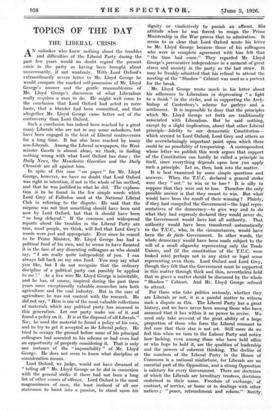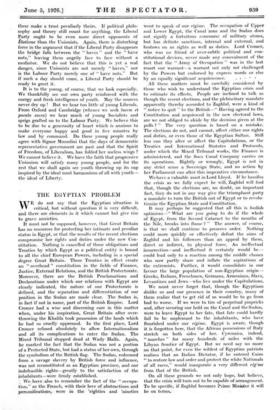TOPICS OF THE DAY
THE LIBERAL CRISIS
AN onlooker who knew nothing about the troubles and difficulties of the Liberal Party during the past few years would no doubt regard the present crisis in the party as having been brought about unnecessarily, if not wantonly. - With -Lord Oxford's extraordinarily severe letter to Mr. Lloyd George he would compare the marked self-possession of Mr. Lloyd George's answer and the gentle reasonableness of Mr. Lloyd George's discussion of what Liberalism really re quires a man to do. He might well come to the conclusion that Lord Oxford had acted in mere haste, that a blunder had been committed, and that altogether Mr. Lloyd George came better out of the controversy than Lord Oxford.
Such a conclusion has indeed been reached by a great many Liberals who are not in any sense onlookers, but have been engaged in the heat of Liberal controversies for a long time. It has also been reached by many non-Liberals. Among the Liberal newspapers, the West- minster Gazette is almost alone, we think, in finding nothing wrong with what Lord Oxford has done ; the Daily News, the Manchester Guardian and the Daily Chronicle are all against him.
In spite of this case " on paper " for Mr. Lloyd George, however, we have no doubt that Lord Oxford was right in intention, if not in the whole of his method, and that he was justified in what he did. The explana- tion is to be found in the few simple words which Lord Grey of Fallodon used at the National Liberal Club in referring to the dispute. He said that the surprise was not that something should have been said now by Lord Oxford, but that it should have been " so long delayed." If the common and widespread reports about the troubles in the Liberal Party are true, most people, we think, will feel that Lord Grey's words were just and appropriate. Ever since he ceased to be Prime Minister, Mr. Lloyd George has had a political fund of his own, and he seems to have flaunted it in the face of any dissenting colleagues as who should say, " I am really quite independent of you. I can always fall back on my own fund. You may say what you like, but I do not recognize that the ordinary discipline of a political party can possibly be applied to me !" As a live wire Mr. Lloyd George is inimitable, and he has, of course, inspired during the past three years some exceptionally valuable researches into both agriculture and the coal industry. But in the case of agriculture he was not content with the research. He did not say, " Here is one of the most valuable collections of materials which any political party has amassed in this generation. Let our party make use of it and found a policy on it. It is at the disposal of all Liberals." No ; he used the material to found a policy of his own, and to try to get it accepted as the Liberal policy. He tried to occupy the ground-before some of his principal colleagues had assented to his scheme or had even had an opportunity of properly considering it. That is only one instance -of the "impossibility " of Mr. Lloyd Georp. He does not seem to know what discipline or consideration means.
Lord Oxford, we judge, would not have dreamed of " telling off " Mr. Lloyd George as he did in connexion with the general strike if there had not been a long list of other causes of offence. - Lord Oxford is the most magnanimous of men, the least. inclined of all our statesmen to burst into a passion, to stand upon his dignity or vindictively to punish an affront. His attitude when he was forced to resign the Prime Ministership in the War proves that to admiration. It seems to us clear that Lord Oxford wrote his letter to Mr. Lloyd George because those of his colleagues who were in complete agreement with him felt that " the time had come." They regarded Mr. Lloyd George's provocative independence in a moment of great stress and anxiety in the party as the last straw. It may be frankly admitted that his refusal to attend the meeting of the " Shadow " Cabinet was used as a pretext for the break.
Mr. Lloyd George wrote much in his letter about his adherence to Liberalism in deprecating " a fight to a finish " in the strike, and in supporting the Arch- bishop of Canterbury's scheme for parleys and a settlement. It is impossible to deny that the principles which Mr. Lloyd George set forth are traditionally associated with Liberalism. But he said nothing, except by a slight implication, about that other Liberal principle—fidelity to our democratic Constitution— which seemed to Lord Oxford, Lord Grey and others as the overwhelmingly important point upon which there could be no possibility of temporizing. A correspondent whose letter we publish this week argues that support of the Constitution can hardly be called a principle in itself, since everything depends upon how you apply such a principle. Let us, then, look into the matter.
It is best examined by some simple questions and- answers. When the T.U.C. declared a general strike were they " out " to win or to lose ? It is silly to, suppose that they were out to lose. Therefore the only possible answer is that they meant to win. But what! would have been the result of their winning ?
if they had compelled the Government—the legal repre-. sentatives of the democracy—to give way and to dcr what they had expressly declared they would never do,1 the Government would have lost all authority. That l authority would have been transferred automatically to the T.U.C., who, in the circumstances, would have. been the de facto Government. In other words, the' whole democracy would have been made subject to the will of a small oligarchy representing only the Trade Unions, and (if the constitution of the T.U.C. were looked into) perhaps not in any strict or legal sense representing even them. Lord Oxford and Lord Grey, though they felt that the Government must be supported, in this matter through thick and thin, nevertheless held! that so grave a matter should be discussed by the whole " Shadow " Cabinet. And Mr. Lloyd George refused to attend.
For those who take politics seriously, whether they are Liberals or not, it is a painful matter to witness: such a dispute as this. The Liberal Party has a great history, and we have never been among those who have, assumed that it has within it no power to revive. We need only take account of the great ability of a large proportion of those who form the Liberal remnant to feel sure that their star is not set. Still more do we feel this when we turn to the Labour Party and notice how lacking, even among those who have held office or who hope to hold it, are -the qualities of leadership and the powers of coherent thinking. The decline of the numbers of the Liberal Party in the House of Commons is a national misfortune, for Liberals are in- essential part of the Opposition, and a strong Opposition is salutary for every Government. There are doctrines of which the Liberals are' hereditary trustees, doctrines enshrined in their name. - Freedom of exchange, of contract, of service, at home or in dealings with other nations ; " peace, retrenchment and reform." Sufety these make a trust peculiarly theirs. If political philo- sophy and theory still count for anything, the Liberal Party ought to be even more direct opponents of Etatisme than the Unionists. Again, there is disturbing force in the argument that if the Liberal Party disappears the bridge falls between the " haves " and the " have nots," leaving them angrily face to face without a mediator. We do not believe that this is yet a real danger, since Unionists are not merely " haves," nor is the Labour Party merely one of " have nots." But if such a day should come, a Liberal Party should be ready to greet it.
It is to the young, of course, that we look especially. We thankfully see our own party reinforced with the energy and fresh intelligence of youth. May the sources never dry up ! But we hear too little of young Liberals. From Oxford and Cambridge (whence we seek lucem et pocula sacra) we hear much of young Socialists and sprigs grafted on to the Labour Party. We believe this to be due to a generosity of heart which is anxious to make everyone happy and good in five minutes by law and by command. Do these young people really agree with Signor Mussolini that the days of democratic representative government are past and that the Spirit of Freedom, of Liberalism, has folded her useless wings ? We cannot believe it. We have the faith that progressive Unionism will satisfy many young people, and for the rest that we shall again see youth throwing up its cap inspired by the ideal most harmonious of all with youth— the ideal of Liberty.











































 Previous page
Previous page